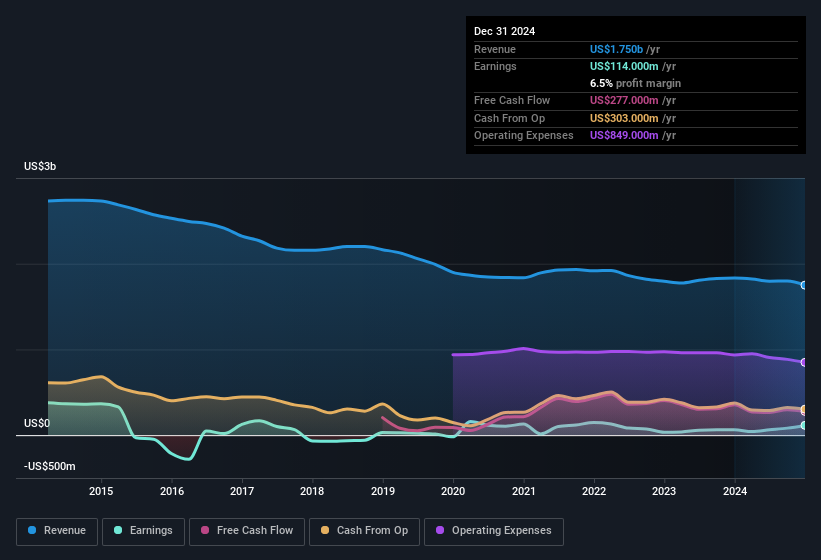Despite posting healthy earnings, Teradata Corporation's (NYSE:TDC ) stock has been quite weak. We have done some analysis, and found some encouraging factors that we believe the shareholders should consider.
See our latest analysis for Teradata

Examining Cashflow Against Teradata's Earnings
Many investors haven't heard of the accrual ratio from cashflow, but it is actually a useful measure of how well a company's profit is backed up by free cash flow (FCF) during a given period. The accrual ratio subtracts the FCF from the profit for a given period, and divides the result by the average operating assets of the company over that time. You could think of the accrual ratio from cashflow as the 'non-FCF profit ratio'.
Therefore, it's actually considered a good thing when a company has a negative accrual ratio, but a bad thing if its accrual ratio is positive. While it's not a problem to have a positive accrual ratio, indicating a certain level of non-cash profits, a high accrual ratio is arguably a bad thing, because it indicates paper profits are not matched by cash flow. That's because some academic studies have suggested that high accruals ratios tend to lead to lower profit or less profit growth.
For the year to December 2024, Teradata had an accrual ratio of -0.96. That indicates that its free cash flow quite significantly exceeded its statutory profit. Indeed, in the last twelve months it reported free cash flow of US$277m, well over the US$114.0m it reported in profit. Teradata's free cash flow actually declined over the last year, which is disappointing, like non-biodegradable balloons.
That might leave you wondering what analysts are forecasting in terms of future profitability. Luckily, you can click here to see an interactive graph depicting future profitability, based on their estimates.
Our Take On Teradata's Profit Performance
As we discussed above, Teradata's accrual ratio indicates strong conversion of profit to free cash flow, which is a positive for the company. Because of this, we think Teradata's underlying earnings potential is as good as, or possibly even better, than the statutory profit makes it seem! Furthermore, it has done a great job growing EPS over the last year. At the end of the day, it's essential to consider more than just the factors above, if you want to understand the company properly. With this in mind, we wouldn't consider investing in a stock unless we had a thorough understanding of the risks. Case in point: We've spotted 1 warning sign for Teradata you should be aware of.
This note has only looked at a single factor that sheds light on the nature of Teradata's profit. But there is always more to discover if you are capable of focussing your mind on minutiae. Some people consider a high return on equity to be a good sign of a quality business. While it might take a little research on your behalf, you may find this free collection of companies boasting high return on equity, or this list of stocks with significant insider holdings to be useful.
Valuation is complex, but we're here to simplify it.
Discover if Teradata might be undervalued or overvalued with our detailed analysis, featuring fair value estimates, potential risks, dividends, insider trades, and its financial condition.
Access Free AnalysisHave feedback on this article? Concerned about the content? Get in touch with us directly. Alternatively, email editorial-team (at) simplywallst.com.
This article by Simply Wall St is general in nature. We provide commentary based on historical data and analyst forecasts only using an unbiased methodology and our articles are not intended to be financial advice. It does not constitute a recommendation to buy or sell any stock, and does not take account of your objectives, or your financial situation. We aim to bring you long-term focused analysis driven by fundamental data. Note that our analysis may not factor in the latest price-sensitive company announcements or qualitative material. Simply Wall St has no position in any stocks mentioned.
About NYSE:TDC
Teradata
Provides a connected hybrid cloud analytics and data platform in the United States and internationally.
Undervalued with proven track record.
Similar Companies
Market Insights
Community Narratives



